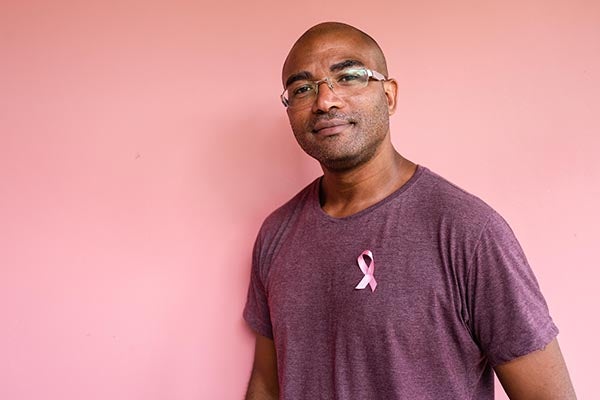Breaking the stigma: Male breast cancer is rare but real
October 14, 2025Categories: Blog Posts
Tags: Oncology, Breast Surgery
 While breast cancer is often thought of as a disease that only impacts women, men can also be diagnosed. Though male breast cancer is rare, accounting for less than 1 percent of all cases in the U.S., it can happen. That’s why it’s important for men to recognize the symptoms and not be afraid to reach out for help—especially during Breast Cancer Awareness Month.
While breast cancer is often thought of as a disease that only impacts women, men can also be diagnosed. Though male breast cancer is rare, accounting for less than 1 percent of all cases in the U.S., it can happen. That’s why it’s important for men to recognize the symptoms and not be afraid to reach out for help—especially during Breast Cancer Awareness Month.
Kristin Krupa, MD, a breast surgeon at Complete Breast Care Langhorne and Trinity Health Mid-Atlantic Yardley, explains that, because men and women both have breast tissue, anyone can develop breast cancer.
“Of course, it is much more common in women than in men. One in eight American women will be diagnosed with breast cancer, while one in 1,000 men will be diagnosed. Breast cancer is 100 times less common among men and is considered rare, which is why there’s a lack of awareness,” says Dr. Krupa. “But what we don’t want to happen is for a man to feel something in the breast, ignore it and not be aware that it could happen to them.”
Symptoms and treatment
Unlike women, who should receive an annual mammogram starting at age 40 if they are of average risk, there are no breast cancer screening guidelines for the average male. Therefore, it’s up to them to pay attention to their body and take action if anything seems abnormal. Men who have developed breast cancer may have similar symptoms to what women experience, including breast pain, discharge and/or a hard mass that gets bigger.
If male breast cancer is detected, the patient may have a lumpectomy—a procedure that involves removing only the cancerous part of the breast—if they are a candidate. According to Dr. Krupa, many men undergo a mastectomy—the removal of the entire breast—for various reasons.
“The cancer usually presents behind the areola area in the central part of the breast. Because a man has less breast tissue, it’s hard to do breast conservation surgery and leave the rest of the breast intact,” says Dr. Krupa. “Also, men tend to present with a later stage breast cancer, meaning the cancer is bigger and it’s harder to do a lumpectomy.”
The impact of BRCA1 and BRCA2
Just like women, men should be aware of family history and genetic mutations, which could increase their risk of developing breast cancer. Two main genes are considered when assessing someone’s risk: BRCA1 and BRCA2. According to National Comprehensive Cancer Network Guidelines, men with the BRCA1 gene have a 0.2-1.2 percent chance of developing breast cancer by age 70, versus women with the BRCA1 gene, who have a 60-72 percent chance. As for men with BRCA2, their risk is 1.8-7.1 percent by age 70, while women’s risk is 55-69 percent.
“For men with these gene mutations, we recommend that they start doing a self breast exam and undergoing education to know what to look for in their breast tissue starting at age 35. They can also consider doing a clinical breast exam every 12 months starting at age 35,” says Dr. Krupa. “This means they would see a breast cancer surgeon like myself once a year. They want someone who does breast exams all the time and knows what they’re looking for.”
Men—especially those with the BRCA2 gene who are closer to the 7 percent risk—can also consider getting an annual mammogram. This can either begin at age 50 or 10 years before the earliest known breast cancer in their family, whichever comes first.
Even if a man doesn’t have these genetic mutations, certain lifestyle factors like obesity, low physical activity, diabetes, heavy alcohol use and radiation exposure can increase his risk for developing breast cancer. Men should make sure these factors are under control with diet and exercise, limiting alcoholic drinks to one or two per week and speaking to a provider if necessary.
Don’t ignore the signs
The most important thing, concludes Dr. Krupa, is for men to be aware of their body and understand that breast cancer is a rare but real possibility for them.
“It’s hard sometimes with the stigma that we have in society. But take ownership of your health and advocate for yourself. If you’re concerned about a breast mass, don’t not say anything because you’re embarrassed,” says Dr. Krupa. “Even though one in 1,000 might sound like a small number, it still happens and we want people to be aware.”
